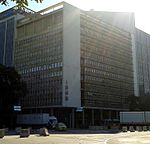The United Nations Conference on Sustainable Development (UNCSD), also known as Rio 2012, Rio+20 (Portuguese pronunciation: [ˈʁi.u ˈmajʒ ˈvĩtʃi]), or Earth Summit 2012 was the third international conference on sustainable development aimed at reconciling the economic and environmental goals of the global community. Hosted by Brazil in Rio de Janeiro from 13 to 22 June 2012, Rio+20 was a 20-year follow-up to the 1992 United Nations Conference on Environment and Development (UNCED) held in the same city, and the 10th anniversary of the 2002 World Summit on Sustainable Development (WSSD) in Johannesburg.
The ten-day mega-summit, which culminated in a three-day high-level UN conference, was organized by the United Nations Department of Economic and Social Affairs and included participation from 192 UN member states – including 57 Heads of State and 31 Heads of Government, private sector companies, NGOs and other groups. The decision to hold the conference was made by UN General Assembly Resolution A/RES/64/236 on 24 December 2009. It was intended to be a high-level conference, including heads of state and government or other representatives and resulting in a focused political document designed to shape global environmental policy.During the final three days of the Conference, from 20 to 22 June 2012, world leaders and representatives met for intense meetings which culminated in finalizing the non-binding document, "The Future We Want", which opens with: "We the Heads of State and Government and high-level representatives, having met at Rio de Janeiro, Brazil, from 20 to 22 June 2012, with the full participation of civil society, renew our commitment to sustainable development and to ensuring the promotion of an economically, socially and environmentally sustainable future for our planet and for present and future generations."








